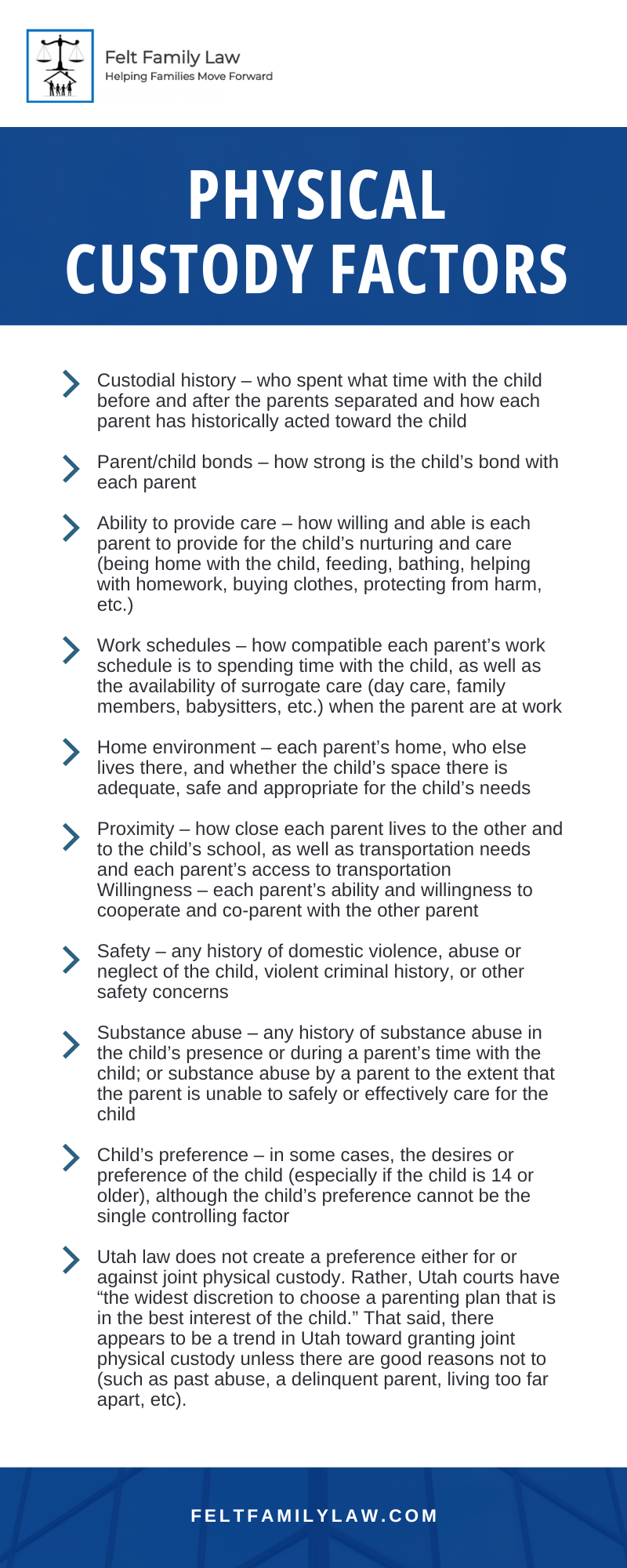There are two kinds of child custody in Utah – Legal Custody and Physical Custody. This article addresses Physical Custody. Within the physical custody spectrum, parent time can follow many different parent-time plans. For joint physical custody, Utah courts should designate a primary custodian or primary residence.
PHYSICAL CUSTODY
Physical Custody in Utah literally means, “the child stays with each parent overnight for more than 30% of the year, and both parents contribute to the expenses of the child in addition to paying child support.” Utah Code 30-3-10.1(3)(a).
Whether there a parent has sole physical custody or joint physical custody depends on how many overnights per year each parent has with the child. If one parent gets less than 110 overnights, the other parent by definition gets sole physical custody. If each parent gets 111 or more overnights each year, then they both get joint physical custody.
Within the physical custody spectrum, parent time (or “PT”) can follow one of many different plans:
- Minimum PT (< 110 overnights = sole physical custody)
- “Extended” PT (145/220 overnights = joint physical)
- “6/8” PT (roughly 156/209 overnights = joint physical)
- 50/50 PT (182/183 or 183/182 overnights = joint physical)
- Restricted PT (less than minimum PT or supervised PT = sole physical)
- Relocation PT (where parents live too far apart to share custody = sole physical)
- Custom PT Plans (sometimes to accommodate parents’ work schedules)
- Other parent time and physical custody arrangements are also possible. These include minimum
- PT for children under the age of 5; split custody where some of the children live with one parent and their siblings live with the other parent; and shared custody where parents share custody or parent-time with a grandparent or other third party.
PHYSICAL CUSTODY FACTORS
- When Utah courts determine physical custody, they look and many factors:
- Custodial history – who spent what time with the child before and after the parents separated and how each parent has historically acted toward the child
- Parent/child bonds – how strong is the child’s bond with each parent
- Ability to provide care – how willing and able is each parent to provide for the child’s nurturing and care (being home with the child, feeding, bathing, helping with homework, buying clothes, protecting from harm, etc.)
- Work schedules – how compatible each parent’s work schedule is to spending time with the child, as well as the availability of surrogate care (day care, family members, babysitters, etc.) when the parent are at work
- Home environment – each parent’s home, who else lives there, and whether the child’s space there is adequate, safe and appropriate for the child’s needs
- Proximity – how close each parent lives to the other and to the child’s school, as well as transportation needs and each parent’s access to transportation
- Willingness – each parent’s ability and willingness to cooperate and co-parent with the other parent
- Safety – any history of domestic violence, abuse or neglect of the child, violent criminal history, or other safety concerns
- Substance abuse – any history of substance abuse in the child’s presence or during a parent’s time with the child; or substance abuse by a parent to the extent that the parent is unable to safely or effectively care for the child
- Child’s preference – in some cases, the desires or preference of the child (especially if the child is 14 or older), although the child’s preference cannot be the single controlling factor
Utah law does not create a preference either for or against joint physical custody. Rather, Utah courts have “the widest discretion to choose a parenting plan that is in the best interest of the child.” That said, there appears to be a trend in Utah toward granting joint physical custody unless there are good reasons not to (such as past abuse, a delinquent parent, living too far apart, etc).
PRIMARY CUSTODIAN/PRIMARY RESIDENCE
When joint physical custody is granted, Utah courts are required by law to designate a “primary custodian” or “primary residence.” This designation lets schools know which parent’s address to use for school attendance and lets the parents know which address to list as the child’s primary address. The designation often goes to the parent who receives the most parent time overnights. When a parent has sole physical custody, that parent is automatically presumed to be the primary custodian and their address is presumed to be the child’s primary residence.
CUSTODIAL PARENT FOR HOLIDAYS
Another similar-sounding designation is used for dividing holiday parent-time. The terms “custodial parent” and “non-custodial parent” are commonly used to assign who gets what holidays for which years under the Utah statutory holiday calendar. The “primary custodian” for school and residency is not always the same parent as the designated “custodial parent” for holiday purposes.
IN A NUTSHELL: Joint physical custody in Utah means that each parent gets 110 or more overnights each year with their child. Sole physical custody means one parent gets less than 110 overnights. Utah courts look at a number of factors in determining physical custody. For joint physical custody, the courts may designate a “primary custodian” or “primary residence” which should not be confused with the designation “custodial parent” for holiday purposes.
If you like this article, check out more of our articles here and like us on social media. For legal advice about your specific case, contact Felt Family Law today!
This article is intended for general information purposes and should not be construed as legal advice. For legal advice about Utah Family Law or about your specific case, contact an attorney near you.
Physical Custody & Parent Time Infographic

Child Custody Disputes And Mediation
As our Utah child custody lawyer understands, child custody disputes can be emotionally challenging for families. When you are going through child custody disputes and want to learn more about mediation, it can be helpful to learn from frequently asked questions.
What Is The Role Of Mediation In Child Custody Disputes?
Mediation offers a collaborative approach for parents to reach agreements on child custody outside of court. A trained mediator facilitates discussions, helping parents explore options and find solutions that prioritize the best interests of their children. We guide parents through the mediation process, fostering constructive communication and empowering them to make informed decisions about their children’s future.
Can Mediation Work If There Is High Conflict Between Parents?
Yes, mediation can be effective even in high-conflict situations. The mediator creates a neutral environment where both parents can express their concerns and work towards mutually acceptable solutions. Through open communication and active listening, parents can address underlying issues and develop a parenting plan that promotes cooperation and stability for their children. Our experienced team at Felt Family Law & Mediation specializes in managing complex emotions and facilitating productive discussions, helping families navigate challenging custody disputes with compassion and respect.
What Are The Benefits Of Choosing Mediation For Child Custody Matters?
As our Utah child custody lawyer can tell you, mediation offers several benefits compared to traditional litigation. It allows parents to maintain greater control over the outcome of their case, as they actively participate in crafting custody agreements tailored to their unique circumstances. Mediation is also typically faster, less costly, and less adversarial than going to court. Additionally, the collaborative nature of mediation can help preserve co-parenting relationships and reduce the emotional toll on children. We believe in empowering families to find amicable solutions through mediation, promoting healthier outcomes for everyone involved.
Is Mediation Legally Binding For Child Custody Agreements?
Yes, any agreements reached through mediation can be legally binding if both parents consent and the court approves the final agreement. Once a parenting plan is finalized and signed by both parties, it becomes a court order enforceable by law. Our team can tell you that a mediator will ensure that all agreements comply with legal requirements and address relevant issues, providing parents with peace of mind knowing their custody arrangements are legally sound and in the best interests of their children.
How Do I Get Started With Mediation For My Child Custody Dispute?
If you’re considering mediation for your child custody matter, the first step is to schedule a consultation with our trusted team. During this initial meeting, we’ll discuss your concerns, explain the mediation process, and answer any questions you may have. From there, we’ll work together to develop a customized mediation plan that meets your needs and helps you navigate your custody dispute effectively. Don’t hesitate to reach out to us today to take the first step toward resolving your child custody matter through mediation.
At Felt Family Law & Mediation, we’re here to support you every step of the way. Contact our Utah child custody lawyer today to schedule your consultation and find peace of mind amidst your child custody dispute.


